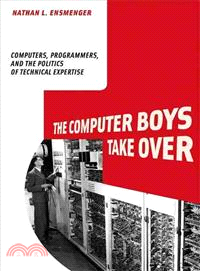The Computer Boys Take over: Computers, Programmers, and the Politics of Technical Expertise
商品資訊
系列名:History of Computing
ISBN13:9780262050937
出版社:Mit Pr
作者:Nathan Ensmenger
出版日:2010/08/13
裝訂/頁數:精裝/336頁
規格:23.5cm*15.9cm*3.2cm (高/寬/厚)
商品簡介
作者簡介
相關商品
商品簡介
"This book provides the most holistic approach to the history of the development of programming and computer systems so far written. By embedding this history in a sociological and political context, Ensmenger has added hugely to our understanding of how the world of computing and its work practices came to be." Martin Campbell-Kelly, Professor of Computer Science, Warwick University
"The Computer Boys Take Over shows how computer programmers struggled for professional legitimacy and organizational recognition from the early days of ENIAC through the $300 billion Y2K crisis. Ensmenger's descriptions of `computer science' and `software engineering,' as well as his portraits of Maurice Wilkes, Alan Turing, John Backus, Edsger Dijkstra, Fred Brooks, and other pioneers, give a compelling introduction to the field." Thomas J. Misa, Director of the Charles Babbage Institute, University of Minnesota
"The Computer Boys Take Over rewrites the history of computing by recounting the development of software in terms of labor, gender, and professionalization. Ensmenger meets the long-standing challenge to reform computer history by employing themes of vital interest to the general history of science and technology." Ronald Kline, Bovay Professor in History and Ethics of Engineering, Cornell University
Like all great social and technological developments, the "computer revolution" of the twentieth century didn't just happen. People-not impersonal processes-made it happen. In The Computer Boys Take Over, Nathan Ensmenger describes the emergence of the technical specialists-computer programmers, systems analysts, and data processing managers-who helped transform the electronic digital computer from a scientific curiosity into the most powerful and ubiquitous technology of the modern era. They did so not as inventors from the traditional mold, but as the developers of the "software" (broadly defined to include programs, procedures, and practices) that integrated the novel technology of electronic computing into existing social, political, and technological networks. As mediators between the technical system (the computer) and its social environment (existing structures and practices), these specialists became a focus for opposition to the use of new information technologies. To many of their contemporaries, it seemed the "computer boys" were taking over, not just in the corporate setting, but also in government, politics, and society in general.
Ensmenger follows the rise of the computer boys as they struggled to establish a role for themselves within traditional organizational, professional, and academic hierarchies. He describes the tensions that emerged between the craft-centered practices of vocational programmers, the increasingly theoretical agenda of academic computer science, and the desire of corporate managers to control and routinize the process of software development. In doing so, he provides a human perspective on what is too often treated as a purely technological phenomenon.
"The Computer Boys Take Over shows how computer programmers struggled for professional legitimacy and organizational recognition from the early days of ENIAC through the $300 billion Y2K crisis. Ensmenger's descriptions of `computer science' and `software engineering,' as well as his portraits of Maurice Wilkes, Alan Turing, John Backus, Edsger Dijkstra, Fred Brooks, and other pioneers, give a compelling introduction to the field." Thomas J. Misa, Director of the Charles Babbage Institute, University of Minnesota
"The Computer Boys Take Over rewrites the history of computing by recounting the development of software in terms of labor, gender, and professionalization. Ensmenger meets the long-standing challenge to reform computer history by employing themes of vital interest to the general history of science and technology." Ronald Kline, Bovay Professor in History and Ethics of Engineering, Cornell University
Like all great social and technological developments, the "computer revolution" of the twentieth century didn't just happen. People-not impersonal processes-made it happen. In The Computer Boys Take Over, Nathan Ensmenger describes the emergence of the technical specialists-computer programmers, systems analysts, and data processing managers-who helped transform the electronic digital computer from a scientific curiosity into the most powerful and ubiquitous technology of the modern era. They did so not as inventors from the traditional mold, but as the developers of the "software" (broadly defined to include programs, procedures, and practices) that integrated the novel technology of electronic computing into existing social, political, and technological networks. As mediators between the technical system (the computer) and its social environment (existing structures and practices), these specialists became a focus for opposition to the use of new information technologies. To many of their contemporaries, it seemed the "computer boys" were taking over, not just in the corporate setting, but also in government, politics, and society in general.
Ensmenger follows the rise of the computer boys as they struggled to establish a role for themselves within traditional organizational, professional, and academic hierarchies. He describes the tensions that emerged between the craft-centered practices of vocational programmers, the increasingly theoretical agenda of academic computer science, and the desire of corporate managers to control and routinize the process of software development. In doing so, he provides a human perspective on what is too often treated as a purely technological phenomenon.
作者簡介
Nathan Ensmenger is Assistant Professor of the History and Sociology of Science at the University of Pennsylvania.
主題書展
更多
主題書展
更多書展今日66折
您曾經瀏覽過的商品
購物須知
外文書商品之書封,為出版社提供之樣本。實際出貨商品,以出版社所提供之現有版本為主。部份書籍,因出版社供應狀況特殊,匯率將依實際狀況做調整。
無庫存之商品,在您完成訂單程序之後,將以空運的方式為你下單調貨。為了縮短等待的時間,建議您將外文書與其他商品分開下單,以獲得最快的取貨速度,平均調貨時間為1~2個月。
為了保護您的權益,「三民網路書店」提供會員七日商品鑑賞期(收到商品為起始日)。
若要辦理退貨,請在商品鑑賞期內寄回,且商品必須是全新狀態與完整包裝(商品、附件、發票、隨貨贈品等)否則恕不接受退貨。
























